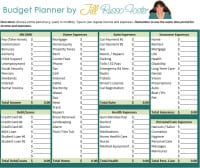This is an important lesson that we all have to learn with our finances. If we spend less than we earn, we have money to save and can pay our bills in full each and every month. If we spend more than we earn, we will incur debt. Debt creates a future obligation which is another expense for our budget.
Not all debt is bad debt, but debt can be the enemy of your budget. Good debt is paying for education that is going to give you a better job / career path. Bad debt is I want this now and I don’t have a way of paying for it, so I will use my credit card.
How do you know if you are living below your means? You need to track your spending for at least a month. Track your net income and all your expenses to see if you have more money coming in or more going out. This is the only way to see where your money is going. You might be surprised where your money is going. Once you see where your money is going, then it’s time to determine if you want or need to make changes to your expenses. It’s not always about reducing or eliminating your expenses. Sometimes the choice is that you need more income. You will never know until your see where your money is going.
Leave a Reply